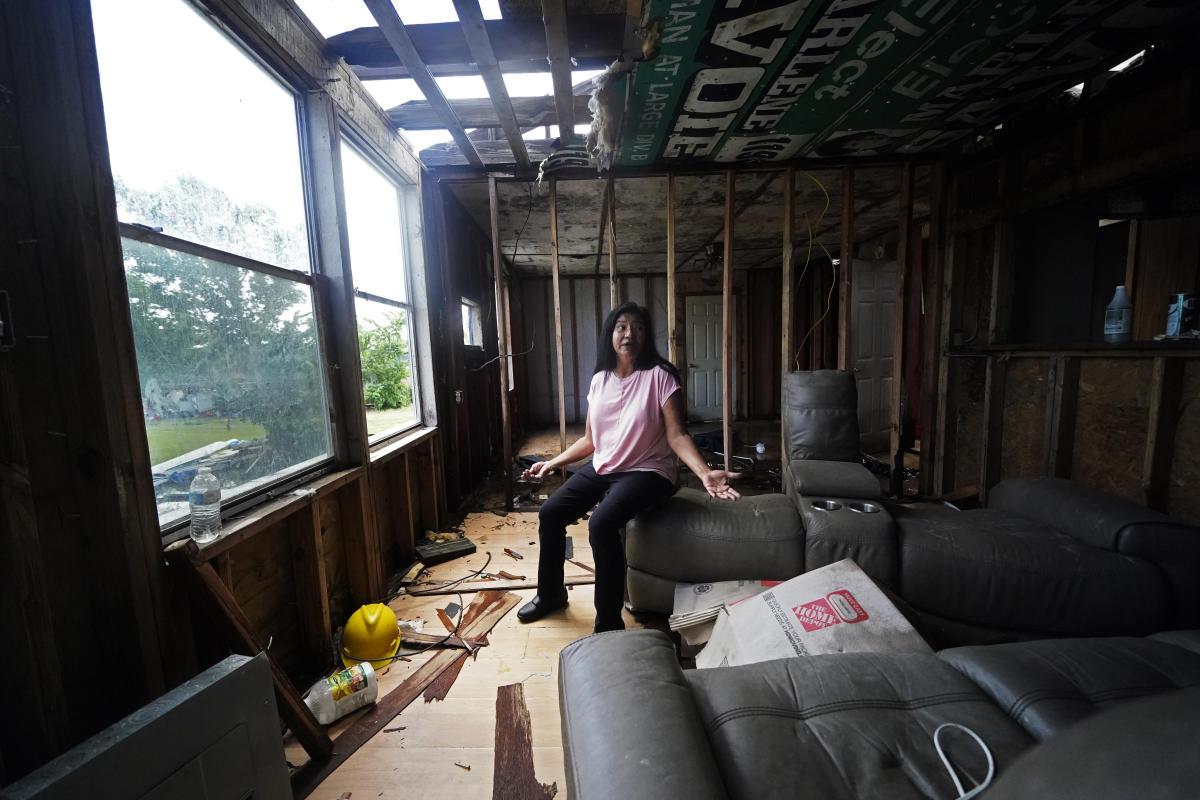
ALONG BAYOU POINTE-AU-CHIEN, La. (AP) — Driving through her village along a southeastern Louisiana bayou, tribal official Cherie Matherne points out the remnants of house after house — including her own — wrecked nine months ago when Hurricane Ida roared through the Pointe-au-Chien Indian Tribe community.
Beige trailers from the Federal Emergency Management Agency and travel campers sit next to pilings that elevated homes 14 feet (4.3 meters) off the ground to protect them from flooding. But it was the wind that got them this time. For hours, the Category 4 hurricane tore off roofs and siding, ripped out insulation and scattered treasured belongings. It destroyed shrimp boats and tossed crab traps.
“It’s going to take years before people can get back to their lives. The majority of people are still at a standstill,” said Matherne, the tribe’s cultural heritage and resiliency coordinator.
When Hurricane Ida barreled through southeast Louisiana on Aug. 29, it slammed into an area home to many Native American tribes, battering people already struggling to overcome decades of coastal erosion, the long shadow of discrimination and a more recent catastrophe — the pandemic.
As a new hurricane season begins, the sounds of recovery — the pop of nail guns and whine of circular saws — are largely absent. And tribal officials worry an equally bad season could put their people in the crosshairs again.
“Ida was the worst storm we’ve ever had in our area,” said August Creppel, chief of the United Houma Nation. The tribe’s roughly 19,000 members are spread across coastal Louisiana, about 11,000 of whom experienced some sort of damage from Ida, according to Creppel.
“Some of our people don’t even have a house to go back to,” he said.
Other tribes in southeastern Louisiana also were hammered. Pointe-au-Chien Indian Tribe member Theresa Dardar said only about 12 homes in the lower part of the Pointe-Au-Chien community where many tribal members live actually survived the storm. Farther west, where many members of the Grand Caillou/Dulac Band of Biloxi-Chitimacha-Choctaw live, Chief Shirell Parfait-Dardar said everyone had some sort of damage, with about 20% of homes a total loss, even her own.
Native Americans have lived in the southeastern Louisiana bayou regions that stretch toward the Gulf of Mexico since long before French explorer Rene-Robert Cavelier reached the mouth of the Mississippi River in 1682 and claimed it for France — launching waves of colonization that would drastically alter the landscape and Native peoples’ way of life.
After colonization, the bayous became a place of refuge to Native people pushed out of their homelands by violence or disease, said Liz Ellis, assistant professor of history at New York University. That trend accelerated after the American Revolution as more settlers moved into the region, she said.
Historically, the Native American people in these areas are intimately tied to the land and water. Many make their living shrimping or crabbing in the marshes and estuaries; their parents and grandparents before them also trapped muskrats or nutria.
But decades of development have eroded that land from under them. Levees built to prevent the Mississippi River from flooding have starved coastal Louisiana of the fresh sediment it needs to rebuild land; canals dug to facilitate oil and gas development or shipping have allowed saltwater to encroach farther inland.
That means the buffers of land, trees and marsh grass that once protected Native American communities from storms in the Gulf have dwindled even as climate change portends a future of stronger, wetter hurricanes that pack more storm surge and intensify more quickly.
Lester Naquin’s father, a trapper, used to take his son crabbing and shrimping. Naquin remembers when there was so much land that his family raised cattle behind his house in Pointe-au-Chien. Now, he said, if you go past the levee to fish from a pirogue — a type of canoe traditionally used by many Native Americans in this region — you’ll be catching speckled trout, a saltwater fish.
The 70-year-old Naquin loves the bayou. That’s why he decided to come back even after Ida destroyed the home he used to share with his extended family. With FEMA money and materials and contractors paid for by a charity, he’s been one of the few to rebuild in the region, although the home is significantly smaller than before. He’s still living in a FEMA-supplied trailer while the interior of the house is finished.
But for a man who used to live with multiple generations, it’s lonely in the trailer. And he’s not sure how many of his family will move back. The shell of his nephew’s home still stands next door. But this is where Naquin grew up, where his memories are. There are people, he said, who move from place to place. He’s not one of them.
“As long as I can stay down here, I will,” he said.
Decades of discrimination against Native people in southeast Louisiana reverberate today in ways that affect their ability to prepare for and recover from hurricanes, tribal officials say.
Discrimination restricted where they could go to school, and when they were allowed to go to school, many faced harassment. Louise Billiot, a tribal official with the United Houma Nation who helps people get job training, said she can see the ripple effects of that lack of education among tribal elders who have difficulty using computers or cellphones to file hurricane claims or track their appeals.
The tribes most affected by Ida did not have federal recognition, although they’re engaged in a lengthy, decadeslong process seeking it. Tribal officials say federal recognition would give them better access ahead of storms to funding for stronger, more hurricane-resistant homes and other programs to help improve their members lives.
After storms, federal recognition would allow them to negotiate directly with the federal government, tribal officials say. When the Seminole Tribe of Florida was hit by Hurricane Irma in 2017, the federally recognized tribe requested and received an emergency declaration from then-President Donald Trump to help address their needs.
In the aftermath of Ida, there was even confusion about whether some tribes were state recognized. A resolution that failed to make it out of the Legislature this session sought to reaffirm their state recognition, saying the lack of clarity “inhibited the delivery of life-saving aid during Hurricane Ida.”
As it is, tribal members are essentially acting on their own, applying for FEMA or other types of aid.
Parfait-Dardar said the Grand Caillou/Dulac Band of Biloxi-Chitimacha-Choctaw is looking at ways residents can rebuild homes stronger than before. “We’re an adapting people, always have been,” she said.
But that takes more money than most people have, and she worries that tribal members who cannot afford to rebuild will be forced to move, with high housing prices pushing them farther and farther away. The tribe is exploring the possibility of resettling to another area, but that is also costly. And this is their home.
Rebuilding also can be an exhausting process, especially for older tribal members who might not be physically able to do the back-breaking work of gutting their house or who struggle to afford repairs on a fixed income. Tribal officials worry about the stress many of their members are experiencing.
Irene Verdin, a 67-year-old member of the United Houma Nation who lives in the Pointe-au-Chien area, is living in a FEMA trailer next to the remains of her house, where mementos and pieces of water-logged furniture still lie on the floor. Her roof is long gone — somewhere in the marshes behind her house. Showing the house to a reporter, she repeatedly apologizes for the mess.
She is the main caretaker for her bed-bound sister-in-law, who has had two strokes. And Verdin’s 73-year-old husband, who used to work on boats, had a heart attack this year. In his younger years, when they needed money for something like a car or repairs to their house, he’d work a bit extra to cover it. But his health now makes that impossible. Since the storm, her own blood pressure is climbing.
Deciding what to do is almost paralyzing. She’d like to rebuild, but just getting an estimate from a contractor is difficult — let alone finding a way to pay for construction. Verdin said she sometimes feels like those living down the bayou are forgotten.
“It’s still up in the air in my head. It’s still up in the air as to what we’re going to do,” she said. “It’s hard.”
___
Follow Santana on Twitter @ruskygal.




